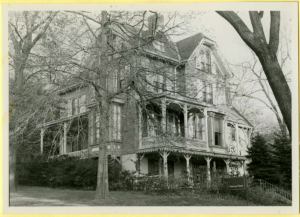To Chatham’s Board of Trustees and President Barazzone,
First, I know that my letter is long, but I hope that you will accord me the same consideration I gave your e-mail and read it until its conclusion. I have agonized over the words I wish to write in response to the information that I received today and ultimately have decided to follow my heart and begin with an anecdote.
I was a student who wrote that I would never consider a woman’s college when I filled out the questionnaire before the PSAT. I said that because I did not truly understand what a woman’s college was or how it could benefit me. Then I saw Chatham on Fastweb and clicked for information only because I thought the name sounded interesting. Needless to say, I was a bit shocked when the brochure arrived and I realized that Chatham was a woman’s college. Admittedly, my first instinct was to discard the materials, but then something in the countenance of the young woman on the front cover stopped me and I began to read.
Chatham promised the opportunity for young women to discover their voices and passions and to exist in a place, for a few years at least, unlike most other places in this country. Chatham offered, without stating it blatantly, a place where a high-school kid could discover her identity and grow strong in it away from the ever-oppressive influence of patriarchy—so that when she re-entered that society, she would do so transformed—she would do so world-ready. It is a place where girls enter and, at its very best, women emerge. I was so intrigued that I traveled nearly 1400 miles to visit and upon setting foot on the campus, my decision was made.
The years that followed changed me in a way that no coed institution could have managed. I was forced to speak in class and discovered that my thoughts had value. While I had participated readily in elementary school, I had grown silent as I matured (a fate that statistically befalls most girls as they become increasingly self-conscious adolescents), but I found that silence was not an option at Chatham—in fact, it even hurts your average. I had the privilege of participating on Chatham’s soccer team where I formed lifelong friendships and memories. Also I held my first high-level leadership positions, including a stint as VP of Chatham’s student government—something I never would have attempted at a coed school. I became increasingly certain of my scientific aptitude even in the face of subjects that challenged me beyond what I had been prepared for in high school. Succinctly, I had the opportunity to experience and benefit from everything that Chatham College had promised to offer and it altered my life trajectory in a way unlike the way coed institutions altered the lives of friends I’ve made in my time after Chatham. But enough of the sentimentality, let’s talk stats.
First, I applaud your desire to study the effect that introducing co-education might have on the Chatham community. Your desire demonstrates a thoughtfulness and thoroughness that most governing boards lack. I too agree that there has been a great deal of growth and evolution at Chatham recently. The name of the school and its designation changed, buildings were acquired, and the endowment grew. These are all admirable and worthy achievements—they are things of which the Chatham community can be proud. I can even understand your concern, that the undergraduate population seems stagnant, and I too wish to find a solution to this issue. But here is where our visions diverge. I recognize Chatham as being something unique in the greater Pittsburgh area, an area that boasts more than twenty-five four-year public and private institutions. It is the only remaining woman’s college in the area and so it inhabits a unique niche in the city. A statistic shared in the e-mail I read this evening stated the following: “80% of first-year college students attend a school within 200 miles of their home.” This statement underpins Chatham’s need to maintain its unique status as it allows it to easily stand out against the backdrop of the many other “moderately selective” colleges and universities in the greater Pittsburgh area. The decision to go coed would rob it of this designation and thereby increase the likelihood that it could be out-competed by similarly sized, structured, and funded institutions.
The appeal of opening up the undergraduate population to potential male students is understandable. One could view this act as potentially doubling the applicant pool since males make up approximately 50% of the global population. However, I find that outcome unlikely and my reasoning will point you towards Carlow University. Chatham seems to be following a very similar trajectory to Carlow—although, admittedly, it will have held onto its single-ed designation quite a bit longer. At Carlow 7% of the students are male, despite the fact that Carlow was only a woman’s college for sixteen years and a coed institution for nearly sixty-nine. This statistic leads me to conclude that Chatham’s undergraduate population growth would be minimal and might even be nil. I would challenge the board to ask the current undergraduate population, how many of them would have still chosen Chatham had it been coed at the beginning of their college careers. If only 10% of the current student populations says they would have chosen differently, then Chatham can conclude, quite reasonably, that being coed would actually be detrimental to undergraduate population growth.
In order to address the concern that Chatham’s undergraduate population is not keeping pace with that of the graduate population, I would state that a little more than a decade ago, when I began Chatham, the undergraduate student population was a little more than 400 (436, if I remember correctly); whereas now, according to the 2013 statistics on your website, the undergraduate enrollment is 973. Even allowing for the February 18, 2014 statistic in the Pittsburgh Post Gazette that sets the undergraduate population at 588, one would consider this change to have a positive trajectory. There are fluctuations in growth in any organization and while there is always room for improvement, it makes little sense to me to abandon a growing population simply because it is growing slowly. In my experience, sustainable change happens slowly and over great lengths of time.
When I first began teaching, it was at a school that had not had success on any AP science test in the school’s recent memory. The first year I taught an AP science course, we earned a passing rate of 0%, the second year 16%, and the third 36%. The growth my students and I earned was small, and some might even argue insignificant; but, it was growth and that growth was, for some, transformative—encouraging several students to tackle college majors (environmental engineering) they’d never before considered. Chatham is such a place for its students and to change it would be akin to me no longer teaching AP science courses because my students fail to keep pace with the national passing rate. Such an action, I am certain, we would both consider misguided at best.
I am most concerned though that Chatham believes that gender equity issues still found in our society (pay disparities, ongoing issues concerning a woman’s right to her body, and a barrage of disparaging stereotypes to name a few) can be best solved by abandoning its mission. Chatham’s motto espouses the intent to create women who are so strong and who shine so brilliantly that they might function as cornerstones in our society. Such women are leaders. Such women must necessarily understand the role of diversity and gender in the workplace. So, I would contend that so long as Chatham stays true to its motto, it will invariably achieve these ends. What’s more, I sincerely believe that if it chooses to go coed, it will have begun a path to undermine them.
According to USNWR, less than a third of the top 50 colleges had a woman as president of the student body despite the fact women make up the majority of college students in this nation. At Chatham, women fill 100% of the leadership roles on campus; such a statistic would only decline if Chatham were to go coed. Chatham would actually begin to train fewer female leaders because some of its male students would, rightly, seek out leadership roles on campus. Such a reality would be counter-productive to Chatham’s stated mission.
I agree though that women will only learn to understand the role of diversity and gender in the workplace if they experience a workplace that is both diverse and inclusive of all genders. Thus, I would encourage the board to consider creating a mandate that all students engage in an off-campus internship before graduating. Not only will this raise Chatham’s profile in and effect on the Pittsburgh community at large, but students will also be able to exercise the leadership skills they have developed at Chatham. I would then recommend that the students return to campus in order to participate in a series of reflective discussions with their classmates in order to determine the impact that women leaders might have in their workplaces. Such a discussion would be occurring in a safe space, one where women are statistically more likely to speak out and take risks in their thinking, and so change in our society would be much more likely to occur. The studies completed by the Women’s College Coalition (WCC) already affirm this reality.
The WCC has found that women attending single-sex institutions are more satisfied with their college experience, more likely to choose a traditionally male discipline as their major, have higher self-esteem (women in coed institutions actually experience a drop in self-esteem after their first two years of college), are more likely to further their education, go to medical school, earn more money, and report a higher level of happiness in their lives. Given this data, if Chatham’s leadership truly wishes to continue to advance the position of women in our society, it will choose to remain a women’s college.
The role of higher education is changing in our society and Chatham is in the midst of weathering that storm as it has done many times in the past. Chatham initially taught women how to maintain a home and now it teaches them how to build one. It once encouraged women to aspire to become a Mrs. and now it challenges them to tackle master’s degrees. Could it do all these things as a coed institution? That depends, are all schools the creators of world ready women? Or is Chatham something special? Does it, as it exists at this moment, warrant all the energies once offered to the struggling graduate school that is now thriving? I think so. Chatham’s graduate growth proves that it has leaders who are capable of such innovation and creativity. I encourage you to draw on those attributes now and ensure that Chatham’s undergraduate college remains a college for women. In whatever way you require and I am able, I will certainly do the same.
One day, when I visit Chatham with my own daughter, I will rouse her imagination with stories of a campus where previously silenced voices learn to speak and previously tentative spirits learn boldness. I will ask her if she too feels that the air here settles a little more lightly in the lungs, if her step has become a bit more emboldened, and if she just got the funniest sense that impossible has been saddled with two extra letters. When she quirks a brow (for she will already be significantly louder and bolder than me) and asks: “Is that what this place was?” My greatest hope is that I will be able to say: “Oh, no, that’s what this place is.”
With faith that Chatham will remain a women’s college,
Stephanie Morris
Class of 2007
*Edited 2/19/14 – misspelling







Sheila Confer '94 • Feb 22, 2014 at 7:26 am
Stephanie,
That was absolutely beautiful and perfectly stated. I am crying.
Jennifer Herman • Feb 20, 2014 at 8:50 pm
Very well said, Stephanie!
Emily Woodward '90 • Feb 19, 2014 at 8:51 pm
Thank you for finding the words I’ve been struggling to gather all day.
Tricia • Feb 19, 2014 at 10:44 pm
Bravo Steph! Beautifully written and well-said.
Karen • Feb 19, 2014 at 10:28 pm
Then she will teach her son to be brave, thoughtful, and outspoken, for those are the qualities that now make up her character. She will teach him to be kind and respectful of all opinions. She will encourage him to explore and study all sides of an issue. She will show him how to be uplifting to everyone, including his competition. She will teach him to fight for change for issues that are important no matter their popularity. She will teach him to own who he is no matter the opinions of others in society.
Stephanie Morris • Feb 19, 2014 at 7:31 pm
Such an amazing response, Karen! I definitely will aspire to do such things!
Veronica Leone • Feb 19, 2014 at 10:23 pm
Thank you for writing this and putting many of our shared thoughts as alumnae into such an articulate message.
Stephanie Morris • Feb 19, 2014 at 10:02 pm
Thank you so much for the positive comments. If I have a son, I’ll teach him about the beauty that is found in one’s acknowledgement of his/her agency and the power that he possesses to create positive change in a society that is still largely patriarchal. Also, I’ll still take him to campus because Chapel Hill is really great for sledding!
Just a note: In the first sentence, I mean to say that my letter is “long” not “wrong.” Clearly my typing skills need work!
Joe • Feb 19, 2014 at 9:34 pm
What if you have a son?
Emily Cassel • Feb 19, 2014 at 9:18 pm
Absolutely beautifully written, Stephanie! I couldn’t agree more. This letter is a perfect demonstration of the results of a Chatham College for Women education. Thank you for sharing your thoughts and research with all of us!
Kelly McKown • Feb 19, 2014 at 7:28 pm
Well said!